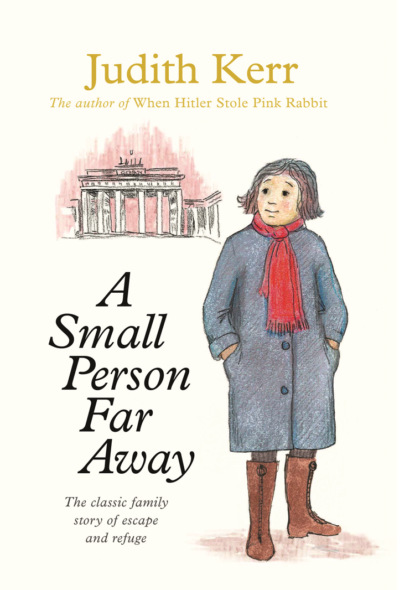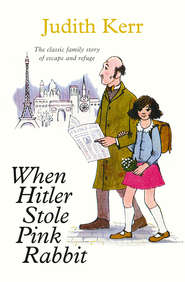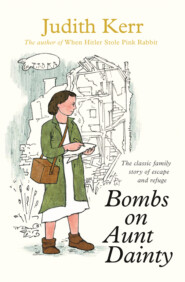По всем вопросам обращайтесь на: info@litportal.ru
(©) 2003-2024.
✖
A Small Person Far Away
Настройки чтения
Размер шрифта
Высота строк
Поля
He shook his head. “It would mean war with America.”
“I know. But it still frightens me.”
“Were you very frightened when you escaped from Germany?”
“That’s what’s so silly. I never realized till much later what it had been about. In fact, I remember making some idiotic remark at the frontier and Mama having to shut me up. Mama made it all seem quite normal.” They trudged along among the puddles. “I wish at least I’d answered her letter,” she said.
Once back in the flat, she became very practical. “We’d better make a list,” she said, “of all the things that have to be seen to, like the rug being delivered. And what are you going to eat while I’m away? I could cook something tonight for you to warm up.”
She made the list and decided about the food, and by the time Konrad’s call was due she felt ready to cope with anything he might say. Sitting by the telephone, she rehearsed the various things she wanted to ask him and waited. He came through punctually at nine o’clock. There was a jumble of German voices and then his, reassuringly calm.
“How is Mama?” she asked.
“Her condition is unchanged,” he said and then in what was obviously a prepared speech, “I think it is right that you should come tomorrow. I think that one of her relatives should be here.”
“Of course,” she said. She told him the number of her flight and he said that he would meet it.
Richard, listening beside her, said, “What about Max? Has he told him?”
“Oh yes,” she said. “What about Max?”
Konrad said that he had not yet cabled Max – that must mean that there was no immediate danger, thought Anna – but that he would do so if necessary in the morning. Then he said in his concerned refugee voice, “My dear, I hope you’re not too upset by this. I’m sorry to have to break up the family. With luck it won’t be for long.”
She had forgotten that he always referred to Richard and herself as the family. It was friendly and comforting and she suddenly felt much better.
“That’s all right,” she said. “Richard sends his love.” There was something more she wanted to ask him, but she had trouble remembering what it was. “Oh yes,” she said. “How did Mama ever develop pneumonia in the first place?”
There was a silence, so that at first she thought he had not heard. Then his voice answered, and even through the distortion of long distance she could tell that it sounded quite different.
“I’m sorry,” he said flatly. “But your mother took an overdose of sleeping pills.”
Sunday (#ulink_b2b57193-73bd-50e2-a239-345b80e41175)
Anna’s feet were so heavy that she could only walk very slowly. It was hot in the street and there was no one about. Suddenly Mama hurried past. She was wearing her blue hat with the veil, and she called to Anna, “I can’t stop – I’m playing bridge with the Americans.” Then she disappeared into a house which Anna had not even noticed. She felt sad to be left alone in the street like that, and the air was getting hotter and heavier all the time.
It shouldn’t be so hot so early in the morning, she thought. She knew it was early because Max was still asleep. He had taken the front wall off his house to let out the heat, and she could see him sitting in his living room with his eyes closed. Beside him, his wife Wendy was blinking drowsily in a chair with the baby in her arms. She looked at Anna and moved her lips, but the air had become too thick to carry the sound and Anna could not hear her, so she walked away, along the hot, empty street, with the hot, empty day stretching before her.
How did I come to be so alone? she thought. Surely there must be someone to whom I belong? But she could think of no one. The heavy air pressed in on her, so that she could hardly breathe. She had to push it away with her hands. And yet there was someone, she thought, I’m sure there was. She tried to remember his name, but her mind was empty. She could think of nothing, neither his name nor his face nor even his voice.
I must remember, she thought. She knew that he existed, hidden in some tiny wrinkle of her brain, and that without him nothing was any good, nothing would ever be any good again. But the air was too heavy. It was piled up all round her, pushing in on her chest, even against her eyes and her nose and her mouth. Soon it would be too late even to remember.
“There was someone!” she shouted, somehow forcing her voice through the thickness. “I know there was someone!”
And then she was in bed with the sheets and blankets twisted all round her and a pillow half over her face, and Richard saying, “It’s all right, love. It’s all right.”
For a moment she could only lie there, feeling him close and letting the horror flow out of her. She half-saw, half-felt the familiar room, the shapes of a chair, a chest of drawers, the faint glint of a mirror in the darkness.
“I had a dream,” she said at last.
“I know. You nearly blew me out of bed.”
“It was that awful one when I can’t remember you.”
His arms were round her. “I’m here.”
“I know.”
In the glow from the street lamp outside the window, she could just see his face, tired and concerned.
“It’s such an awful dream,” she said. “Why do you suppose I have it? It’s like being caught in some awful shift of time and not being able to get back.”
“Maybe some trick of the brain. You know – one lobe remembering and the other not picking it up till a fraction of a second later. Like déjà vu, only the other way round.”
It did not comfort her.
“Suppose one got stuck.”
“You couldn’t get stuck.”
“But if I did. If I really couldn’t remember you. Or if I got stuck even earlier, before I’d learned to speak English. We wouldn’t even be able to talk to each other.”
“Yes, well,” he said, “in that case we’d have other problems as well. You’d be about eleven years old.”
At this she laughed and the dream, already fading, receded into harmlessness. She could feel herself aching from lack of sleep and remembered clearly, for the first time, about the previous day.
“Oh God,” she said. “Mama.”
His arms tightened about her. “I suppose all this worry has stirred up things you’d almost forgotten. About losing people – people and places – when you were small.”
“Poor Mama. She was awfully good then, you know.”
“I know.”
“I wish to God I’d written to her.” Through the gap between the curtains the sky looked black. “What time is it?”
“Only six o’clock.” She could see him peering at her anxiously in the darkness. “I’m sure it would have made no difference whether you’d written or not. There must have been quite other reasons. She must have been worried about something, or terribly upset.”
“D’you think so?” She wanted to believe him.
“And then, maybe, she thought of your father – how he had died – and she thought, why shouldn’t she do the same?”
No, it wasn’t right.
“Papa was different,” she said. “He was old, and he’d had two strokes. Whereas Mama… Oh God,” she said, “I suppose some people have parents who die naturally.” She stared into the darkness. “The trouble is, you see, I don’t suppose Max has written either, or if he did, the letter may not have got there from Greece.”
“It still wouldn’t be a reason to commit suicide.”
Outside in the street there was a clinking of bottles followed by a clip-clop of the milkman’s horse as it walked on to the next house. A car started up in the distance.









